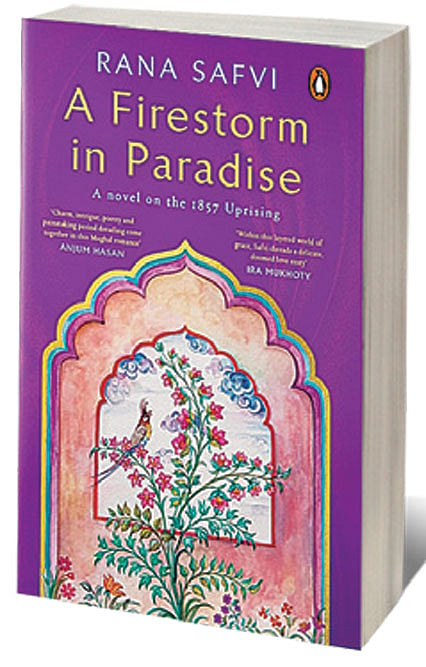Love in the Lost City

FOR AN EVENT that was cataclysmic in its consequences and transformative in the destructive energy of its actions, the details of the Indian Uprising of 1857 are largely forgotten. This amnesia is not accidental. When the forces of the British Empire crushed the uprising and violently took back Delhi, countless documents relating to the city were destroyed, immense treasures were looted, and the largely Muslim gentry of Delhi was evicted, often never to return, leaving the citizens of Delhi bereft of their wealth and their memories. The language of the city itself—Urdu—had already been demonised by the British, carefully crafted into a Persianised ‘other’, a pariah that was only to be associated with the Muslims of India, and therefore orphaned.
Scholar and writer Rana Safvi’s career has been shaped by a restlessly urgent need to reclaim this lost heritage of Delhi. She has published nine books around the monuments, history and culture of the city, including a ground-breaking translation of Sir Syed Ahmad Khan’s Asar us Sanadid into English. Her further translations of Urdu novels into English have also made these historical works accessible to a much wider, urban audience. Her latest book, A Firestorm in Paradise—a love story set amidst the turmoil of 1857 Delhi, is Safvi’s first work of historical fiction.
Safvi grew up in the syncretic cauldron of the city of Lucknow, the great architectural and cultural creation of the Nawabs of Awadh, and she has unconsciously absorbed this Ganga- Jamuni tehzeeb, this syncretic tradition, like a felicitous osmotic experiment, into every fibre of her being. In conversations, Safvi effortlessly segues into Urdu, quoting poetry, dictums and sayings with fluent charm.
AIming High
20 Feb 2026 - Vol 04 | Issue 59
India joins the Artificial Intelligence revolution with gusto
An adopted daughter of Delhi for the past several decades, Safvi’s supreme achievement in A Firestorm in Paradise is to have created the filigree world of Shahjahanabad at the very apotheosis of its exquisite, refined grace. Safvi creates a textured world filled with the colours, the fragrances, the syncretic traditions and the scattershot conversations of the womenfolk of the ‘haram’. Safvi is careful with words, and uses the term ‘haram’—an Arabic word that means ‘sanctuary’—to denote the female quarters, thus distinguishing it from the exoticised, sexualised ‘harem’ of European recordings.
A Firestorm in Paradise is drenched in melancholy and disquiet, despite the love story that threads through it. There is a sense of ennui, of choking claustrophobia even, in the once great capital. Amidst the fraying splendour of the grand Qila the reader is often jolted by an ineffable sense of loss and of ravaged decay. Mughal emperor Bahadur Shah Zafar is now a greying old man, who needs to take a daily ‘yaquti’, or tonic, that purportedly removes debility and restores vigour. Where emperor Shah Jahan once strode with purposeful magnificence through the corridors of the Qila, Zafar has to be carried in a sedan chair. The formidable war elephants of the Mughals who were mythical beasts striking terror in their enemies in the time of Akbar now lumber peacefully through the city, transporting the royal family to their pleasure palaces.
In the end, the sense of foreboding will erupt with sickening inevitability into the carnage of 1857. But the brutal re-taking of Delhi by the British Empire was much more than just the defeat of the elderly Mughal emperor. It was the purposeful and complete eradication of a way of life that had evolved after centuries of encounters, of mingling of languages, religions, and traditions, that had meshed into an immense sea of memories. If 1857 remains the threshold event beyond which an ‘adaab’, or etiquette still exists somewhere in time, forever hidden from us, then A Firestorm in Paradise is a stepping stone towards that genteel past.

